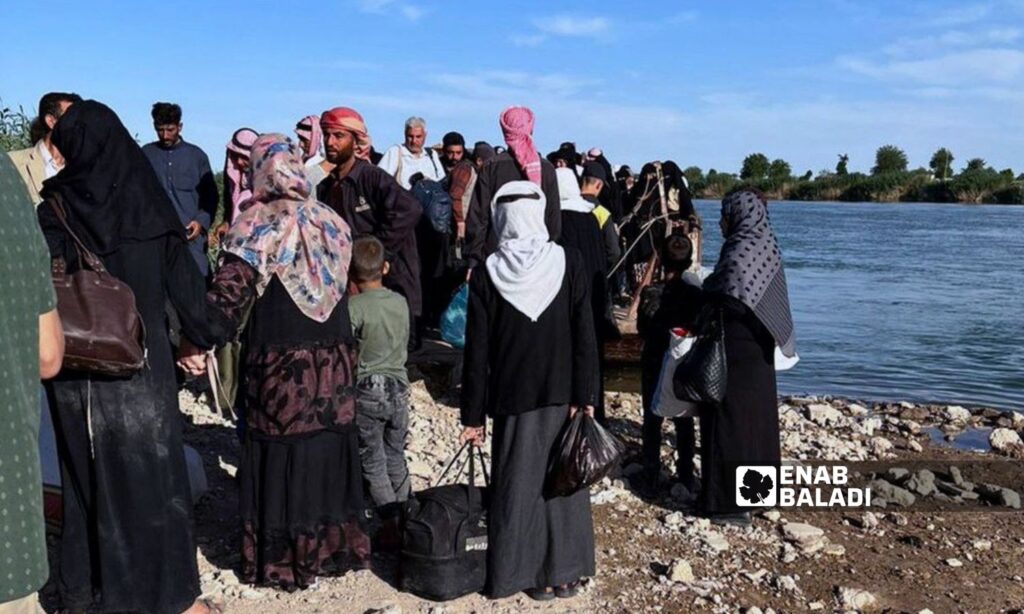The sounds of light and medium weapons clashes interspersed with mortar shells and artillery falling here and there instilled fear into the heart of Hassan’s family in the town of Sabha, in the eastern countryside of Deir Ezzor.
The clashes began after the Syrian Democratic Forces (SDF) announced that they had repelled an attack launched by regime forces and allied militias on the eastern bank of the Euphrates River in Deir Ezzor on the evening of Tuesday, August 6.
A mortar shell fell on Hassan’s house, injuring one of his sons and forcing him to evacuate his home urgently.
Hassan took his injured son to Jadid Bakara Hospital and moved the rest of his family to the village of Hajina in the northern countryside of Deir Ezzor, “looking for a safer place,” he told Enab Baladi.
On the western bank of the Euphrates, controlled by regime forces, the situation was not better for Mohammed in the village of Baqruss, as he told Enab Baladi. He evacuated his house alongside other civilians after Iranian militias introduced rocket launchers among civilian homes to use them in areas controlled by the SDF.
Mohammed mentioned that he moved to the city of Deir Ezzor, noting that the military buildup near the Euphrates began a week before the clashes today, Wednesday, August 7.
According to Enab Baladi‘s correspondent in Deir Ezzor, the artillery exchange between the SDF and the regime forces led to the displacement of residents from the village of Tayba, under regime control, and from the town of Diban, under SDF control.
Not all residents of the four mentioned villages and towns were displaced, with the displacement movement centered in homes near the SDF points.
Ongoing clashes
The clashes started on Tuesday evening and continued until the time of publishing this report after an attack launched by regime forces supported by the National Defense and Arab Tribal Forces on SDF positions in the eastern countryside of Deir Ezzor.
Ibrahim al-Hafl, one of the Arab tribal sheikhs, vowed today in a statement to carry out more attacks on the SDF and to not lay down arms “until the land is liberated from the Qandil terrorist militias (referring to the SDF).”
Al-Hafl, one of the sheikhs of the Akidat tribe and the leader of the Arab Tribal Forces, is accused by the SDF of being affiliated with the Syrian regime.
The attackers took positions in the towns of Diban, Abu Hamam, Gharanij, Shaitat, and Kishkiye after clashes with SDF elements and their subsequent withdrawal.
Clashes also took place in the towns of Sabha, Basira, and Abu Hardub.
The SDF brought in military reinforcements from its controlled areas in the northern countryside of Deir Ezzor, al-Hasakah, Qamishli, and al-Shaddadi, strengthening its presence in the eastern countryside of Deir Ezzor and imposing a curfew.
After hours of clashes and artillery exchanges, the SDF said they had thwarted the attack and that their military units had transitioned to sweeping operations in the villages of Diban, al-Latwa, and Abu Hamam, pursuing “remnants of the regime.”
The SDF accused the head of the General Intelligence Directorate of the regime, Hussam Luka, of being behind the attack.
Hawar News Agency, close to the SDF, published a notice from the National Defense in al-Hasakah, stating that the regime forces, the National Defense, and the Arab Tribal Forces were the ones who carried out the attack.
Enab Baladi obtained a video clip, its authenticity not confirmed, showing the participation of Hashem al-Sattam, nicknamed “Abu Bassam,” the leader of an Iranian-funded militia in Deir Ezzor called the “Sons of the Jazira and Euphrates Movement” in battles on the Diban front.
According to the SDF, the artillery shelling led to the killing of two civilians and injuring five others in Diban and al-Latwa.
Previous clashes and shelling
Since September 2023, mutual shelling has been recurring between the Syrian regime forces and their allies (National Defense and Arab Tribal Forces) and Iranian-backed militias stationed west of the Euphrates River, and the SDF controlling the eastern bank.
In August 2023, eastern and northern rural Deir Ezzor witnessed armed battles between fighters from the Deir Ezzor Military Council, supported by fighters from the Arab tribes and the SDF, which the council falls under.
The two parties clashed in various geographical areas, with the primary focus on the eastern countryside of Deir Ezzor, which directly borders regime-controlled areas.
The confrontations came after the arrest of the Deir Ezzor Military Council leader, Ahmed al-Khabil (Abu Khawla), following a two-month contention between the sides, while the top council leaders remained besieged in al-Hasakah city.
Days after the clashes, the council’s name completely disappeared from the armed confrontations, leaving the SDF and fighters from the local tribes led by Ibrahim al-Hafl as the conflicting parties.
The civilians remain the weakest and most affected party in these clashes.

